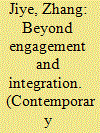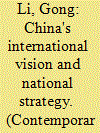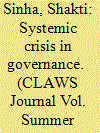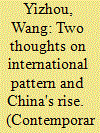| Srl | Item |
| 1 |
ID:
130610


|
|
|
|
|
| Publication |
2014.
|
| Summary/Abstract |
As part of its new strategy of "retuming to the Asia-Pacific region", the A Obama administration has adopted some tough economic policies towards China, notably promoting the Trans-Paci?c Partnership (TPP) and attempting to establish new rules of international trade and investment aimed at strengthening economic ties with other Western countries through the Trans-Atlantic Trade and Investment Partnership Agreement(TTlP ), both of which tend to compress the geopolitical space for China's economic rise. The administration is also using a 'green barrier' to suppress the development of China's high-tech industry, and using economic diplomacy and investment restrictions against Chinese state-owned enterprises. This paper seeks to examine and analyze the causes of shifts in the U .S. economic strategy towards China.
|
|
|
|
|
|
|
|
|
|
|
|
|
|
|
|
| 2 |
ID:
133853


|
|
|
|
|
| Publication |
2014.
|
| Summary/Abstract |
The global order was set in place following the end of the Second World War by a consortium of western countries headed by the U. S. since then, major western countries have strived to maintain their long dominance in global politics and economics. With the rise of nationalist movements, former colonies gained their independence, and many developing countries joined the UN in recent years the economies of the emerging powers have grow rapidly and they have also joined WTO.
|
|
|
|
|
|
|
|
|
|
|
|
|
|
|
|
| 3 |
ID:
131025


|
|
|
|
|
| Publication |
2014.
|
| Summary/Abstract |
Till a few years ago, the Indian elite had convinced itself that India was already seated at the high table of the international order, that there was something natural and given about lndia's rise. This acute sense of triumphalism was unmistakeable. India in 2007 had reason to be con?dent. It was growing fast and furious, had lifted hundreds of millions above the poverty line, and was being courted by leading economies and large investors and the India story seemed a perpetual best-seller. The 2008 trans-Atlantic monetary crisis saw the rich countries go into economic decline whilst India recovered quickly and grew faster than before. The clear conviction was that India had decoupled itself from its economic partners in Europe and North America, and was itself an engine of global economic growth. The fact that China also grew faster than before convinced many that the West was in terminal decline and the future of Asian dominance had arrived. The hubris was not long in coming. Indian policy-makers did seem to have not taken notice of the fact that the high growth of Gross Domestic Product (GDP) post-2003 had resulted Mr Shakti Sinha is former Principal Secretary (Power 8: Industry), Government of National Capital Territory of Delhi and former Chief Secretary, Andaman 8: Nicobar Administration.
|
|
|
|
|
|
|
|
|
|
|
|
|
|
|
|
| 4 |
ID:
133851


|
|
|
|
|
| Publication |
2014.
|
| Summary/Abstract |
The substantial change in the international system since the end of the World War - II has been a boon to non-western nations, which make up three quarters of all the countries today. Most nationalist, populations and countries that had little freedom and almost no voice have representation today in the United Nations and G20,and they benefit from more international investment. Enterprising BRICS countries hold a competitive position in manufacturing, infrastructure construction and international trade. Their role in international rule formations has changed from a taker to an instructor, allowing them to tread their individual development path more confidently.
|
|
|
|
|
|
|
|
|
|
|
|
|
|
|
|